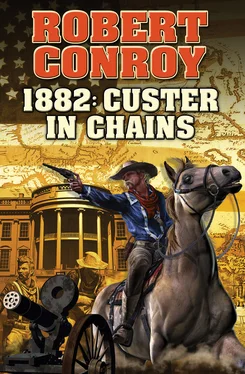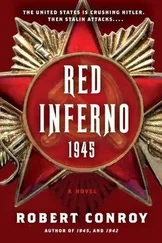Robert Conroy - 1882 - Custer in Chains
Здесь есть возможность читать онлайн «Robert Conroy - 1882 - Custer in Chains» весь текст электронной книги совершенно бесплатно (целиком полную версию без сокращений). В некоторых случаях можно слушать аудио, скачать через торрент в формате fb2 и присутствует краткое содержание. Год выпуска: 2015, Издательство: Baen, Жанр: Альтернативная история, на английском языке. Описание произведения, (предисловие) а так же отзывы посетителей доступны на портале библиотеки ЛибКат.
- Название:1882: Custer in Chains
- Автор:
- Издательство:Baen
- Жанр:
- Год:2015
- ISBN:нет данных
- Рейтинг книги:3 / 5. Голосов: 1
-
Избранное:Добавить в избранное
- Отзывы:
-
Ваша оценка:
- 60
- 1
- 2
- 3
- 4
- 5
1882: Custer in Chains: краткое содержание, описание и аннотация
Предлагаем к чтению аннотацию, описание, краткое содержание или предисловие (зависит от того, что написал сам автор книги «1882: Custer in Chains»). Если вы не нашли необходимую информацию о книге — напишите в комментариях, мы постараемся отыскать её.
1882: Custer in Chains — читать онлайн бесплатно полную книгу (весь текст) целиком
Ниже представлен текст книги, разбитый по страницам. Система сохранения места последней прочитанной страницы, позволяет с удобством читать онлайн бесплатно книгу «1882: Custer in Chains», без необходимости каждый раз заново искать на чём Вы остановились. Поставьте закладку, и сможете в любой момент перейти на страницу, на которой закончили чтение.
Интервал:
Закладка:
Ryder grinned on seeing that their leader was Diego Valdez who saluted and waved expansively. “Colonel Ryder, I bring you two things. First there is a wagon approaching and on it are a number of barrels of water. It will taste like guano, which is bird shit, but it will quench your thirst and not kill you.”
“Bless you, Captain Valdez.” Valdez laughed at the rank he’d been given. “And what’s the second thing?”
“The Spanish have finally stirred themselves and a very large column is on its way to Matanzas.”
* * *
Gilberto Salazar had been angered at his regiment’s poor performance in trying to push the Americans off the hill overlooking Matanzas. His men had moved too slowly and tentatively; thus permitting a large American force to move onto the high ground and chase them off.
It was equally perplexing that General Weyler didn’t seem to care. Weyler commanded a mixed Spanish and Cuban force of about twenty-five thousand men that was moving exquisitely slowly towards Matanzas. It was almost as if the fire-breathing general didn’t want to fight the Americans. Impossible, he thought. Every Spaniard must feel that his honor had been impugned by the presence of the Americans.
Nor had his departure from his home in Havana been pleasant. Juana had been her usual bitchy self and had scarcely deigned to say goodbye. Helga had serviced him with typical German efficiency, satisfying him physically but not emotionally. Damn it to hell, he thought, he was going off to war. He deserved better from his women.
At Weyler’s command, he’d pulled his main force back about five miles from the Americans. He kept patrols out and there were constant brushes with the Americans and their rebel allies. Finally, after several days, General Weyler arrived with a strong escort. The main army was strung out behind him.
Weyler insisted on going close enough to see the American lines. “They are formidable,” he said on seeing the hills scarred by earthworks. “It will cost us a lot in Spanish blood, but with courage and God’s help we will throw them into the ocean.”
A puff of smoke emerged from the highest American held hill. A few seconds later, a cannon shell exploded several hundred yards in front of them. Weyler laughed. “Was that a gentlemanly warning to come no closer or were they panicked by the sight of us? I rather think the former, don’t you, major?”
“Perhaps they will run when they see our army formed up to attack.”
“That would be nice, but it will not happen.”
“May I ask when we will attack?”
“When we are ready, major, and not sooner,” Weyler said stiffly. He did not like the implied criticism. “However, I will say it will take at least a week for this sinfully slow army to arrive and get into position. Then we will have to bombard the Americans before we attack. A bombardment will likely cause very few American casualties, but to attack without one would dishearten our troops.”
Salazar thought that many of Weyler’s soldiers already looked disheartened but kept still. The general must know what kind of men he was leading. He wondered if King Alfonso did and what his royal majesty truly thought of this endeavor.
Then it occurred to him-was the Spanish army merely going through the motions? Would they simply fire a few rounds and retreat to Havana, leaving the rest of the island to the Americans? To run and hide before a smaller American army would be humiliating.
Weyler looked at him carefully. “If I am reading your mind, Salazar, you are concerned that we will depart for Havana after firing a few rounds to satisfy our honor. Do not be concerned. Once we are in place, we will attack and press the attack with vigor. Our goal will be to push the bastards into the ocean.”
* * *
Even though the army had not moved very far inland, Clara Barton thought it prudent for her medical staff to move to Cuba in anticipation of the fighting and not as a response to it. She and her volunteers were well aware that this would be dangerous, but she was proud that they all understood the risks and accepted them. It was the best, perhaps only, way they could treat the freshly wounded.
Their small steamer moved into the calm blue waters of Matanzas Bay and anchored. It was plainly marked as a Red Cross vessel and its arrival clearly stirred up a lot of curiosity. The regular military establishment medical personnel resented the presence of the Red Cross. They considered it an insult to their skills and that the Red Cross was saying that their abilities were somehow inadequate. Miss Barton seemed to agree with that assessment, although she did not quite say it.
The doctors and nurses disembarked onto a handful of lifeboats and small sailboats. Thus, Sarah, Ruth, and the other nurses found themselves all together. A couple of sailors had commenced rowing them to the shore only fifty yards away when one of the nurses shrieked and laughed. Sarah turned and laughed herself. A throng of soldiers was swimming and bathing in the water and every last one was buck naked.
“Ladies, don’t look,” commanded Barton.
“It’s a little too late, besides,” said Ruth, “we’ll see much more of the male anatomy when we start treating them.”
“True enough,” said Barton. Sarah thought her eyes were twinkling with uncharacteristic humor.
The men noticed them and most ran howling and laughing to the shore like little kids caught doing something naughty. A few, however, stood proudly and displayed themselves until they were yelled at by their officers.
“Recognize Martin in that mob?” Ruth asked and this time Clara Barton did smile. Sarah simply stuck out her tongue in response.
Moments after landing, they were met by a thoroughly upset and embarrassed Major General Nelson Miles. “Please accept my apologies, ladies, I had no idea you were coming. If I had I would have had my men behave themselves.”
“I assure you no one was hurt, either physically or emotionally,” Barton responded, “so let us get on with our work.”
Miles assigned a captain to find them a place to erect their tents and sent a detail to help them. Sarah smiled at the captain. “I have relatives and friends with the First Maryland; can you tell me where they are?”
He paused and thought for a moment before pointing to a hill a couple of miles away. “I believe they are up there, ma’am. That is what is called Mount Haney.”
The hill, or mount, was largely covered with lush foliage. She could see places where it had been cleared and indentations in the ground that she assumed were trenches. Martin Ryder was up there, only a few miles away, a decent walk on a pleasant afternoon. Perhaps she could get word to him or her brother that they had arrived.
Something boomed and they froze. The captain was perplexed. “It would appear that the boys up there on the hill have found something worth shooting at,” he said genially.
* * *
Diego Valdez and a score of Cuban insurgents lay in the thick brush that lined the narrow dirt road from Havana. They were several miles inland from the American perimeter and only a few yards from the road. Concealed by the shadows and the foliage, they were invisible. Diego had more men close by, but these were the only ones with rifles, and many of those were relics from wars gone by. A couple of his men had flintlocks that had been used against the English more than a century past. The lack of weapons was a problem that had to be solved.
The Spanish column was long and thin, and moved very slowly. The Spanish troops looked worn down by the heat and disinterested in the whole venture. They slouched and held their rifles any way they wished and few officers were in view. Invariably, breaks in the column occurred and Valdez watched for an opportunity. There. A squad was sauntering along as if they were on the way to Sunday Mass. For just a moment, no other Spaniards could be seen.
Читать дальшеИнтервал:
Закладка:
Похожие книги на «1882: Custer in Chains»
Представляем Вашему вниманию похожие книги на «1882: Custer in Chains» списком для выбора. Мы отобрали схожую по названию и смыслу литературу в надежде предоставить читателям больше вариантов отыскать новые, интересные, ещё непрочитанные произведения.
Обсуждение, отзывы о книге «1882: Custer in Chains» и просто собственные мнения читателей. Оставьте ваши комментарии, напишите, что Вы думаете о произведении, его смысле или главных героях. Укажите что конкретно понравилось, а что нет, и почему Вы так считаете.












